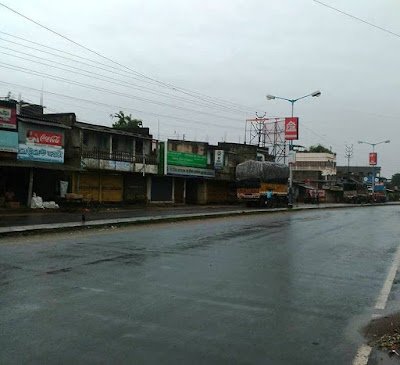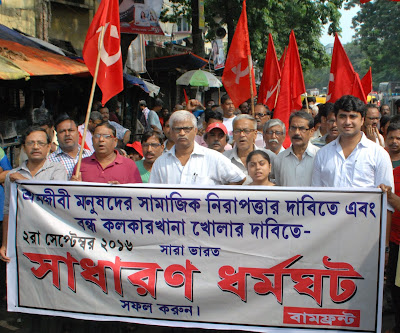September 6, 2016
Valiant Strike in West Bengal Braving Terror
2nd September, 2016
Kolkata: The Strike struggle in West Bengal had to be conducted
against odds and terror created by the TMC government and the ruling party.
Mamata Banerjee administration has the distinction of being the only government
which had declared war against the general strike.
The
state government issued a circular for the state government employees
threatening them with ‘dies non’ and stoppage of salary. Uniquely, the state
government has also declared that the day prior to the strike day and the next
working day would be counted within this instruction. This included all
teachers, municipal staff and all those who are paid from treasury.
The
state government and municipal corporations run by the TMC had initiated
massive advertisement campaign against the strike in media, and in streets.
Public money in millions of rupees was spent on hoardings, banners and
electronic media advertisements.
For
the last few days before the strike, TMC activists roamed in localities and
threatened shopkeepers to remain open on the strike day. Otherwise, shops will
not be allowed to open at all forever, they threatened. Transport workers –
private bus, taxi, auto rickshaws- were threatened and many of them were
forcefully brought from home to run their vehicles. Civic police and TMC
workers were sent to houses of government employees and teachers to warn them. Police
rang Left trade union leaders in Birbhum and other districts not to come out on
streets on the day of strike. Rallies and campaigns in support of strike were
attacked in many parts of the state.
In
Haldia, such a rally was attacked by police even when Dr. Surjya Kanta Misra
was leading it. On September 1, a procession of BPMO was attacked by police in
Medinipore town. CITU leader and CPI(M) state secretariat member Dipak Sarkar,
CPI(M) district secretary Tarun Roy and others were injured in the attack. Similar
attack was launched in industrial area of Gardenreach.
Trade
Union leaders in the state had to declare that if the state government wants a
war to thwart the strike, let it be. They called upon the workers to exert
their right of struggle resisting attempts to impose violence on them.
Braving
this attack, the strike started on a high note from the morning. Striking
workers, Left activists were on the road everywhere. Splash of Red flags
overwhelmed in streets, including Kolkata. Surjyakanta Misra, Biman Basu and
other leading Left leaders led processions in Kolkata. Police started to stop
these processions in Kolkata and the districts.
Earlier,
police used to intervene in road blockades. But on September 2, police blocked
normal processions and began to arrest the leaders. In Siliguri, TU leaders
were picked up in the morning. When a protest rally was organised, CPI(M)
leaders including mayor of Siliguri Corporation, Ashok Bhattacharya and CPI(M)
Darjeeling district secretary Jibesh Sarkar were arrested. CPI(M) district
level leaders were arrested in Kolkata. More than 250 strikers were arrested in
the state. Rallies and street corner meetings were attacked in Ranigunje,
Bankura, Coochbehar, Dhulian, Kalchini.
Strike
received a massive response in Durgapur-Asansol-Ranigunje industrial zone. Most
industries, coal mines, transport remained closed. Most of the tea gardens in
Terai and Dooars were closed. Police entered gardens to break strike even
without informing authorities. In one such case in New Land garden in
Kumargram, the workers who were not participating in the strike too got
infuriated by police action and joined in the strike.
Almost
all jute mills in North 24 Parganas, Howrah and Hooghly were closed. In few
factories, TMC forced workers to open but no production could be managed. Beedi
factories, mainly in Murshidabad were totally closed. Stone crushing factories,
mainly in Birbhum were fully closed. Banks and Insurance, central government
offices were totally closed throughout the state. Bank strikers were arrested
in Howrah.
The
industrial city of Haldia responded extremely well. In Kolkata, commercial
complexes in business areas were closed. Kolkata Port too witnessed massive
strike. Oil sector witnessed 100 percent strike. Construction workers desisted
from attending work, stopping work in numerous projects. Administration forced
buses to ply in Kolkata but with thin traffic. In districts, private transport
was thin and gradually withdrawn as there were very few passengers. Kolkata,
Jadavpur, Presidency universities were closed.
July 17, 2016
Massive Rally against Price Rise
https://goo.gl/photos/kQVB3Gw1XL2ERQ227
KOLKATA: 11th July - THOUSANDS of people marched through the streets of Kolkata on July 11, protesting against price rise, at the call of 17 Left and democratic parties. The rally took up a 16-point charter of demands which included immediate steps to control unprecedented price rise, scrapping of price hike of petro products, withdrawal of allowing FDI in retail and food trade etc. It also raised state-specific demands of proper distribution of food items in PDS and lowering extraordinary hike in power tariff.
KOLKATA: 11th July - THOUSANDS of people marched through the streets of Kolkata on July 11, protesting against price rise, at the call of 17 Left and democratic parties. The rally took up a 16-point charter of demands which included immediate steps to control unprecedented price rise, scrapping of price hike of petro products, withdrawal of allowing FDI in retail and food trade etc. It also raised state-specific demands of proper distribution of food items in PDS and lowering extraordinary hike in power tariff.
The rally started from Y-Channel in
Dharmatala and ended at College Square. It was the biggest mobilisation of the
Left after the assembly elections. Apart from Left Front constituents, JD(U),
RJD, NCP, CPI (ML-Santosh Rana), Bolshevik Party, Workers’ Party, CPB, PDS,
CRLI joined in the march.
After the rally, a public meeting
was held at College Square. Addressing the rally, CPI(M) state secretary
Surjyakanta Misra said, it is true that the main responsibility of price rise
lies with the centre. It is their policies which have fuelled price hike. But
there are many things that a state government can do. The TMC government in
West Bengal is totally inactive in price management. Under the TMC regime,
unprecedented hike in power tariff has burdened common people.
Left Front chairman Biman Basu
alleged that the TMC government has resisted discussion on price rise in state
assembly too. Leaders of 17 parties addressed the rally.
Subscribe to:
Comments (Atom)
































































































